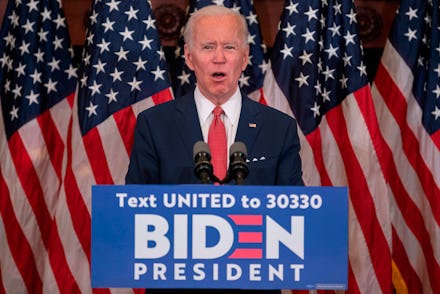Joe Biden addressed the country's racial unrest in the safest way he could

On Tuesday morning, just over one week since the police killing of George Floyd in Minneapolis that launched a wave of protests across the country, former Vice President Joe Biden gave an address to the nation, speaking on what he believes the country needs most right now.
To begin, he offered his thoughts to Black Americans and victims of police brutality. "Millions, in the course of living their life, are saying to themselves, 'I can't breathe,'" he said. Floyd said "I can't breathe" over and over again while Minneapolis police officer Derek Chauvin kneeled on his neck for nearly nine minutes, until he lost consciousness. The same phrase was made famous by Eric Garner, a Black New Yorker who was strangled by police in 2014.
Biden named both Floyd and Garner in his speech, saying that their words were a "wake up call" and that the country needs to respond to them "with action." He also condemned the property damage that has resulted at some protests, saying, "There's no place for violence, no place for looting or destroying property or burning churches or destroying businesses."
He then swiftly turned his attention to police. "Nor is it acceptable for our police, who were sworn to protect and serve all people, to escalate tension [and] resort to excessive violence," he said. The thing is, most Democrats agree that police treat Black people worse than white people, and most police unions have already endorsed Trump. So Biden's words were hardly the firebrand rhetoric of an opposition party candidate, and more the safest possible way for him to acknowledge the moment. He continued: "We have to be vigilant about the violence being done by this president to our economy and to the pursuit of justice," he said, deploying awkward passive-voice phrasing to call out the president's failures.
Trump has blatantly not risen to the moment he is presiding over. On Monday night, he tear-gassed a group of peaceful protesters so he could hold the Bible upside-down for a photo op; before that, he raged on Twitter against Democratic leaders and said protesters near the White House narrowly missed harm at the hands of "ominous weapons" and "vicious dogs." But if Biden wanted to blame someone for militant policing, he'd have done well to look more locally: The equipping of local police department with military-grade weapons and the failure of widespread bias training and background checks have all led to fatal shootings of Black people by police officers. Realistically, local city councils, county supervisors, and state legislatures are the ones who fund police departments, and local juries are the ones that fail to indict or hand down acquittals for officers who kill Black people.
Biden did not urge local governments to take action in his address Tuesday morning, but he did call for compassionate leadership and leadership that's rooted in principles, not power for power's sake. It's emblematic of the dilemma he finds himself in, as a likely presidential candidate who's mired in a campaign season without any actual in-person campaigning, and for whom overexposure has historically proven fraught. He's also facing an allegation of sexual assault — a story that has largely defined his campaign this spring.
For so long, politics has siloed policy issues into specific buckets. But we're at a moment now when many, if not most of them, overlap. The conditions surrounding the recent protests are not just defined by police violence, but also by unemployment levels that rival the Great Depression, a global pandemic that disproportionately harms Black people, and trillions of dollars in student debt that depress economic mobility and solvency.
What is a moderate Democratic leader to do in this moment? To Biden, what's happening now seems to be an opportunity to head back to the drawing board. Tackling seemingly-insurmountable challenges is the American story, he said. "And yes," he said, that includes "protest."